108 Glen Osmond Road, Parkside
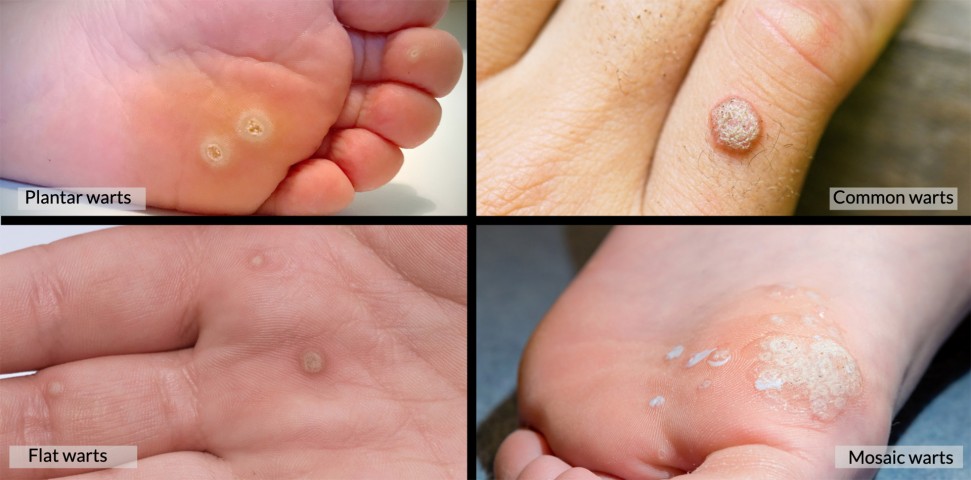
Warts are bumpy, fleshy overgrowths of skin; they are noncancerous and often asymptomatic, so you don't necessarily have to do anything about them, but they are contagious and, in some cases, unsightly.
A virus you've probably heard of before is actually the culprit behind all kinds of warts: human papillomavirus (HPV).
Typically warts are caused by direct contact with HPV-infected skin or fomites [objects or materials that carry infection]. When the virus infects the basal layer of the epidermis and starts to divide, warts are the result.

HPV is able to infect the skin when it's broken, so if you have cracks in your skin from dryness or a cut from an injury, that's an opening for HPV. What type of wart you develop depends largely on the strain of HPV you're exposed to. For example, while some types of HPV preferentially affect the feet (causing plantar warts), other strains are more likely to cause common warts.
People with weakened immune systems are also more at risk of developing warts, including children and the elderly, and those who are immunocompromised through either medicine or illness.
There are actually a few different types of warts, and they are primarily categorized according to where they show up on the body and what they look like. The different types of warts include:
* Common warts: Known as verruca vulgaris, common warts are typically found on the fingers, near the nails, or on the back of hands. These warts are most common in children and can present as rough bumps, sometimes with black dots or "seeds' ' in the middle.
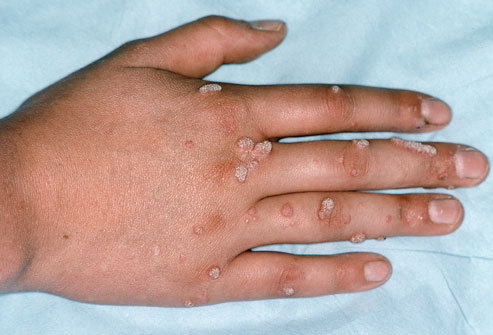
* Plantar warts: These warts usually show up on the soles (aka plantar surface) of the feet, and can grow in clusters. These warts may be painful, and can also have black dots in the middle.

* Flat warts: Warts that can appear anywhere—the AAD says children usually get them on their face; men, under their beards; and women, on their legs. They tend to be smaller and smoother than other warts, but tend to grow in larger numbers (anywhere from 20 to 100 at a time).
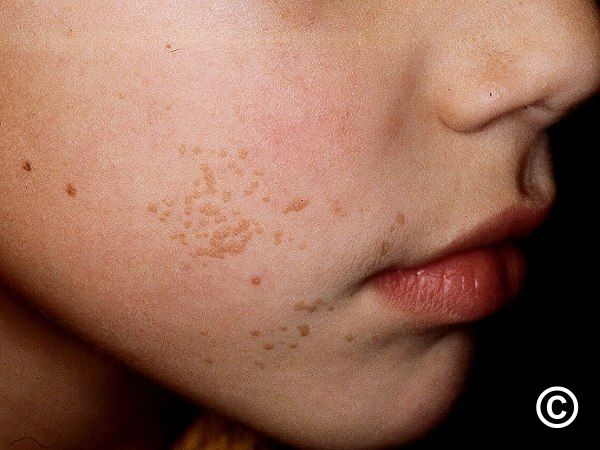
* Filiform warts: These warts have a base from which strands that look like threads or fingers stick out. They often grow quickly and show up on the face - normally around the eyes, mouth, and nose.
* Genital warts: Also called Condyloma acuminatum, these warts appear in the genital area, and appear flesh-colored and flat or bumpy like cauliflower. In women, they can show up on the vagina, cervix, or around the anus. In men, they can pop up on the tip of the penis, around the anus, or on the scrotum, thigh, or groin.

According to Ayurveda, this ailment can be compared with Charmakeela. The pathogenesis of this disease due to vitiation of Vata along with Kapha over the skin causes the development of hard nail structures called Charmakeela. The incidence of warts is highest in children and young adults.
In Ayurveda, the features are described on the basis of domination of the Doshas. In Vata dominated Charmakeela, patient feels pricking type of pain, in Kapha domination it appears like nodule without changing the color of the skin and in Pitta dominated Charmakeela due to vitiation of Rakta (blood), it appears blackish in color, dry, oily and hard in nature.
According to contemporary science, the management consists mainly in destroying the warts by different methods like chemically, electrically or surgically and these can be achieved by cryosurgery, keratolytic ointments, plasters and solutions, curettage, electrodesiccation, and destructive acids.
In Ayurveda, warts can be effectively managed by using the internal herbs like Turmeric, Basil, Giloy, Amla, Ashwagandha, Atibala, Neem, Manjishtha, Sariva, Nimba using their antiviral & immuno-booster actions along with external treatments like kshar karma (Also known as caustic therapy, kshara is derived from the ashes of Ayurvedic herbs. Kshara jala or the alkali solution is applied on the facial warts daily till the condition heals).
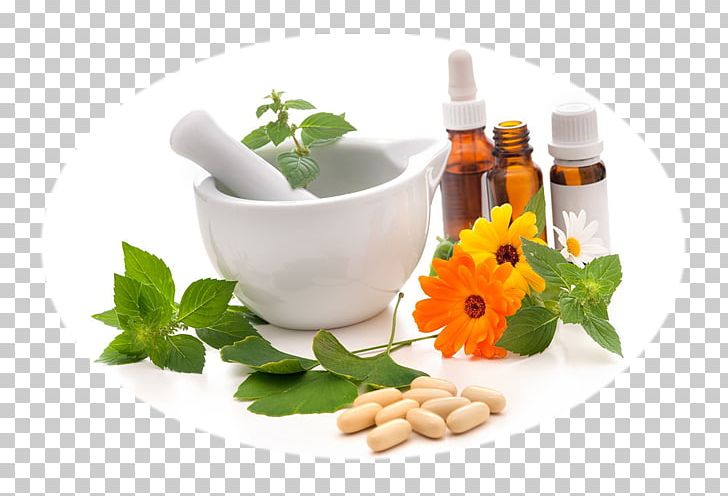
For a customized treatment plan, you can request to book a consultation here: CONTACT
Disclaimer : Sandeep Kumar and Anupam Vasudeva are not GP, they have Ayurveda medical degree from India where it is considered equal to any other medical degree. This qualification is recognized in Australia by vetassess governing body as Complementary Health Therapists. Life Line Ayurvedic Herbal Clinic does not claim to cure a disease or terminal illness and does not create any unreasonable expectation of beneficial treatment. Ayurvedic medicines and treatments are generally considered to be safe but rarely may be associated with possible adverse reactions in individual cases. We recommend seeking urgent medical attention in the case of an adverse reaction. This website provides you with information. You must contact your Ayurvedic or another health professional before you apply them. Read More